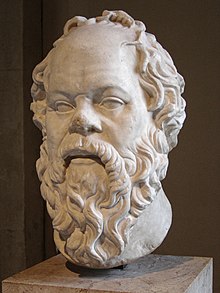 |
| Socrates |
In Plato’s account of the dialogue between Socrates and Phaedrus he describes them walking out of the town to a wooded glade by a stream and sitting down under a plane tree to shelter from the midday sun. Such a time and place has significance in the lore of otherness. Queen Herouis, in the lay of Sir Orfeo, a version in Middle English of the Greek myth of Orpheus and Eurydice, falls asleep at Midday under an apple tree and is visited by otherworld beings and eventually taken into the Otherworld. Socrates comments that the place in which they are sitting is clearly blessed with the presence of nymphs. As the dialogue progresses he shifts his initial position of skepticism about the value of love to an acknowledgement that it must be recognised. The change in his position leads to an exposition in which he speaks not in analytical prose but in verse - specifically, he says, in ’dithyrambics’, adding "Truly the place seems divine [theios], so do not be surprised if I often seem to be numpholeptos as my discourse progresses”.* So perhaps Sir Orfeo owes more than its outline narrative and plot to the Greek myth of Orpheus and Eurydice, but also reflects specific Greek lore about Midday as a liminal time. Morning or evening twilight would seem to be more common in native tradition but we should also note that Herouis is taken to a parallel Otherworld rather than to the Land of the Dead as is Eurydice, and so reflects British rather than a Greek mythos in this respect.
That Socrates should be inspired - the awen falling upon him as we might say - at this place and time, is also interesting. Welsh awenyddion, as described by Gerald of Wales in the 12th century, were inspired to prophesy in this way, and Socrates says that he has a ‘prophetic misgiving’ that in denying love he may have offended a divinity - Eros - and a recantation is necessary. He says that madness is a divine gift which may not be refused, and that love, like prophesy, is a form of madness**. Madness, he goes on, might also come from ‘the soul being possessed by the Muses ….. whoever has no touch of the Muses’ madness comes to the door and thinks to get into the temple by the help of art or poetry, but will not be admitted’.
After much further exposition, including an account of the immortality of the soul, Socrates concludes the dialogue with a prayer:
“Beloved Pan, and all ye other gods who here abide, grant me to be beautiful in the inner man;
and all I have of outer things be at peace with those within”.
Which is as it should be!
-*-
Prayer to Pan from the translation of Plato’s Phaedrus by J. Wright in Socrates A Source Book ed John Ferguson (Macmillan, 1970).
Other references from Jennifer Larson in Greek Nymphs : Myth, Cult, Lore (Oxford, 2001)
*Numpholeptos ('possessed by nymphs') : “the term nympholepsy, which is a blanket word that can be used to describe several overlapping concepts. ….. In such contexts, texts, poetry and prophecy, always closely related, cannot be separated, and the nympholept, like the poet, the Sibyl, or the Pythia, experiences a state of divine madness but not one that his or her contemporaries would regard as pathological.”
(Larson, 1.3)
** Socrates suggests (playfully?) that the letter tau (Greek ’t’) is an insertion into ‘manike’ to make ‘mantike’.
No comments:
Post a Comment
What do you think?